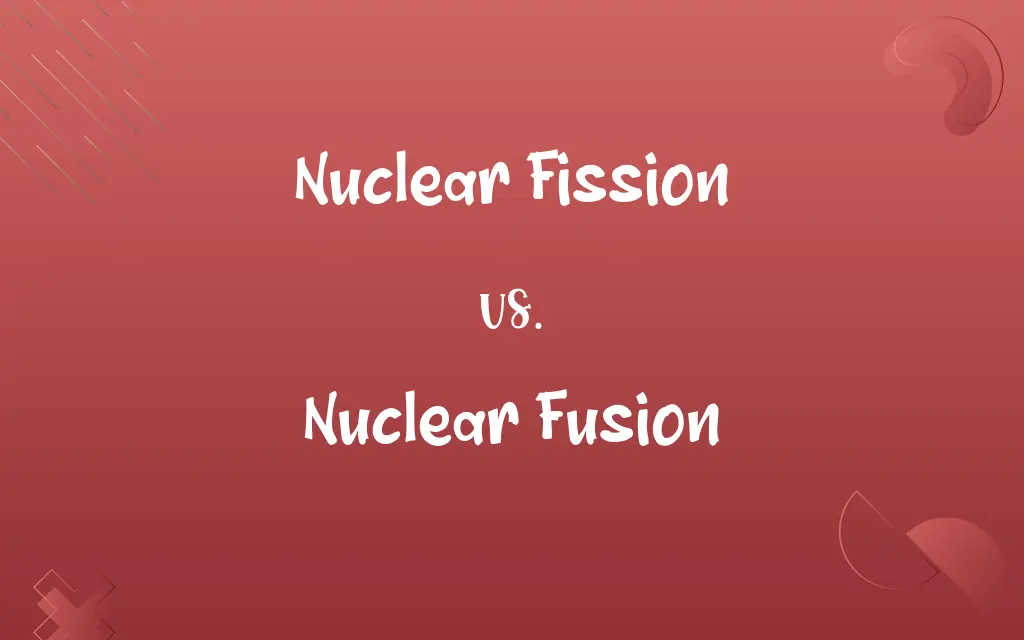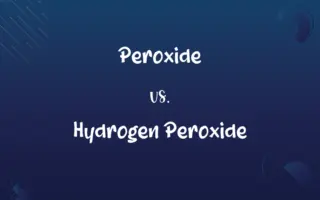Nuclear Fission vs. Nuclear Fusion: Know the Difference

By Shumaila Saeed || Published on December 29, 2023
Nuclear fission splits heavy atoms like uranium into smaller ones releasing energy, while nuclear fusion combines light atoms like hydrogen to form heavier ones, also releasing energy.

Key Differences
Nuclear Fission involves splitting heavy atomic nuclei into smaller, lighter nuclei, releasing a significant amount of energy, primarily used in nuclear reactors and atomic bombs. Nuclear Fusion is the process of combining light nuclei, like hydrogen, to form heavier nuclei, releasing energy, as seen in stars, including the sun.
Shumaila Saeed
Dec 29, 2023
The energy produced in Nuclear Fission comes from the breaking of atomic bonds within heavy elements, commonly uranium or plutonium. In Nuclear Fusion, energy is generated when light atoms, typically isotopes of hydrogen, fuse together under high temperature and pressure.
Shumaila Saeed
Dec 29, 2023
Nuclear Fission reactors use control rods to manage the chain reaction and prevent it from escalating, while Nuclear Fusion requires extremely high temperatures and pressures to initiate and sustain the reaction, which is a significant technical challenge.
Shumaila Saeed
Dec 29, 2023
The byproducts of Nuclear Fission include radioactive waste, which poses a disposal challenge. In contrast, Nuclear Fusion produces minimal radioactive waste, making it a cleaner energy source.
Shumaila Saeed
Dec 29, 2023
Nuclear Fission is currently the basis of nuclear power generation and has known technology for electricity production. Nuclear Fusion remains largely experimental, with the potential for higher energy output and cleaner energy but faces technological hurdles for practical use.
Shumaila Saeed
Dec 29, 2023
ADVERTISEMENT
Comparison Chart
Common Elements Used
Uranium, Plutonium
Hydrogen isotopes (Deuterium, Tritium)
Shumaila Saeed
Dec 29, 2023
Energy Release
Large, from breaking atomic bonds
Extremely large, from fusing nuclei
Shumaila Saeed
Dec 29, 2023
Technical Challenges
Managing chain reactions, radioactive waste disposal
Achieving/containing high temperatures and pressures
Shumaila Saeed
Dec 29, 2023
Current Use
Power generation, atomic bombs
Experimental, potential future power source
Shumaila Saeed
Dec 29, 2023
ADVERTISEMENT
Nuclear Fission and Nuclear Fusion Definitions
Nuclear Fission
Nuclear fission produces radioactive waste as a byproduct, requiring careful disposal.
Dealing with radioactive waste from nuclear fission is a major environmental concern.
Shumaila Saeed
Dec 13, 2023
Nuclear Fusion
Nuclear fusion is the process of combining light atomic nuclei to form heavier ones, releasing energy.
The sun's energy comes from nuclear fusion of hydrogen atoms.
Shumaila Saeed
Dec 13, 2023
Nuclear Fission
A chain reaction process where neutrons split nuclei, releasing energy and more neutrons.
In nuclear fission, each split nucleus releases additional neutrons, perpetuating the reaction.
Shumaila Saeed
Dec 13, 2023
Nuclear Fusion
Fusion requires extremely high temperatures and pressures to overcome atomic repulsion.
Nuclear fusion reactors aim to replicate the sun's high-temperature conditions.
Shumaila Saeed
Dec 13, 2023
Nuclear Fission
Nuclear fission is the splitting of heavy atomic nuclei into smaller ones, releasing energy.
The nuclear power plant generates electricity through nuclear fission.
Shumaila Saeed
Dec 13, 2023
ADVERTISEMENT
Nuclear Fusion
Fusion energy production remains experimental, facing significant technological hurdles.
Achieving controlled nuclear fusion for power generation is still a challenge for scientists.
Shumaila Saeed
Dec 13, 2023
Nuclear Fission
In nuclear reactors, fission is controlled to produce heat for electricity generation.
Control rods in a reactor regulate the nuclear fission process to safely produce heat.
Shumaila Saeed
Dec 13, 2023
Nuclear Fusion
Nuclear fusion is the driving force behind the energy and light of stars.
Stars, including our sun, are natural nuclear fusion reactors.
Shumaila Saeed
Dec 13, 2023
Nuclear Fission
Nuclear fission is used in atomic bombs, releasing immense energy through rapid chain reactions.
The explosive power of atomic bombs comes from uncontrolled nuclear fission.
Shumaila Saeed
Dec 13, 2023
Nuclear Fusion
Theoretically, nuclear fusion could provide abundant and clean energy with minimal waste.
Scientists are researching nuclear fusion as a sustainable energy source.
Shumaila Saeed
Dec 13, 2023
Repeatedly Asked Queries
What is Nuclear Fusion?
Combining light atomic nuclei to form heavier ones, releasing energy.
Shumaila Saeed
Dec 29, 2023
What are the challenges of Nuclear Fission?
Managing chain reactions and radioactive waste.
Shumaila Saeed
Dec 29, 2023
What elements are used in Nuclear Fusion?
Hydrogen isotopes like Deuterium and Tritium.
Shumaila Saeed
Dec 29, 2023
Is Nuclear Fusion used in power generation?
Currently experimental, not yet in practical use.
Shumaila Saeed
Dec 29, 2023
How does Nuclear Fission produce energy?
By breaking bonds in heavy atomic nuclei.
Shumaila Saeed
Dec 29, 2023
What are the challenges of Nuclear Fusion?
Achieving and maintaining extreme temperatures and pressures.
Shumaila Saeed
Dec 29, 2023
How does Nuclear Fusion produce energy?
By fusing light nuclei under high temperatures and pressures.
Shumaila Saeed
Dec 29, 2023
Can Nuclear Fission lead to a meltdown?
Yes, if the reaction is not properly controlled.
Shumaila Saeed
Dec 29, 2023
What's the potential of Nuclear Fusion as an energy source?
High energy output with minimal environmental impact.
Shumaila Saeed
Dec 29, 2023
Does Nuclear Fusion produce greenhouse gases?
No, it's a clean energy source.
Shumaila Saeed
Dec 29, 2023
Are there any environmental concerns with Nuclear Fission?
Yes, radioactive waste disposal.
Shumaila Saeed
Dec 29, 2023
Are there any environmental concerns with Nuclear Fusion?
Minimal, produces less radioactive waste.
Shumaila Saeed
Dec 29, 2023
Can Nuclear Fusion lead to a similar meltdown?
No, fusion reactions quickly stop if conditions are not maintained.
Shumaila Saeed
Dec 29, 2023
Does Nuclear Fission produce greenhouse gases?
No, but its byproducts can be hazardous.
Shumaila Saeed
Dec 29, 2023
Is Nuclear Fission currently more practical than Fusion?
Yes, as it's already used in power generation.
Shumaila Saeed
Dec 29, 2023
Can Nuclear Fusion be used in weapons?
Theoretically yes, but the primary focus is on energy production.
Shumaila Saeed
Dec 29, 2023
Share this page
Link for your blog / website
HTML
Link to share via messenger
About Author
Written by
Shumaila SaeedShumaila Saeed, an expert content creator with 6 years of experience, specializes in distilling complex topics into easily digestible comparisons, shining a light on the nuances that both inform and educate readers with clarity and accuracy.









































































